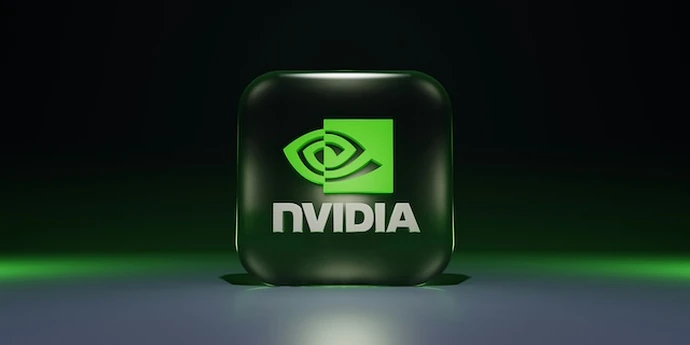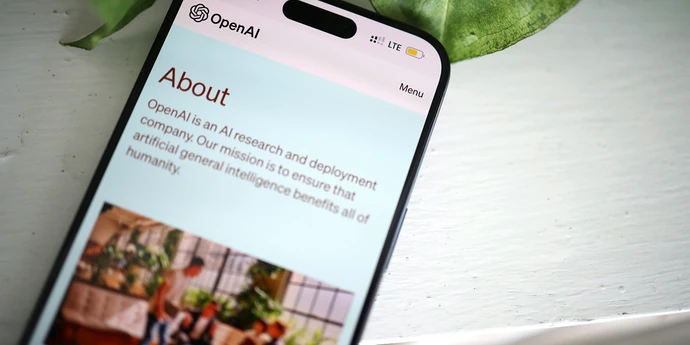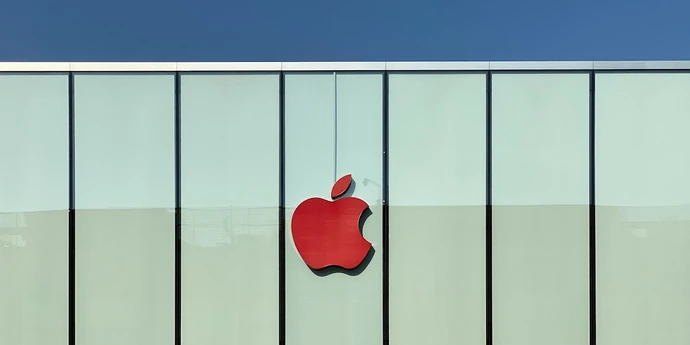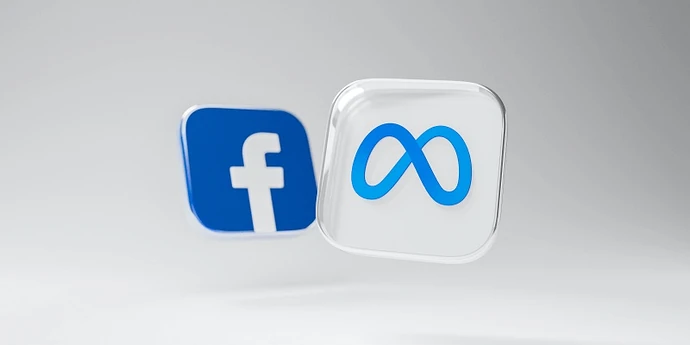Machine learning engineer interviews at Meta are really challenging. The questions are difficult, specific to Meta, and cover a wide range of topics.
You’ll need to demonstrate strong coding skills, machine learning system design expertise, and a clear understanding of Meta’s products and culture.
The good news is that the right preparation can make a big difference and help you land an ML job at Meta. We have put together the ultimate guide below to help you maximize your chances of success.
Special thanks to our expert Meta interview coaches, Engin, Pranav, Tom, and Oussama, for their insights.
Here's an overview of what we'll cover:
Click here to practice 1-on-1 with ML ex-interviewers
If you're applying at Meta for other engineering roles, we have interview guides for production engineer, data engineer, front-end engineer, research engineer, and software engineer roles.
1. Meta machine learning engineer role and salary ↑
Before we go into your Meta machine learning engineer interview process and questions, let’s take a look at the role first.
1.1 What does a Meta machine learning engineer do?
A machine learning engineer at Meta uses machine learning and artificial intelligence advancements to solve Meta’s engineering problems across its diverse ecosystem of products, including its social media apps (Facebook, Instagram, Threads, Workplace), messaging (WhatsApp), AR/VR (Reality Labs), and others.
In this role, your day-to-day will include writing and optimizing code for training and deploying AI/ML models and designing solutions for integrating AI/ML models into products or services.
You’ll have the opportunity to focus on projects you’re passionate about, whether it’s in content moderation, newsfeeds, translation, AR/VR, ads optimization, and others.
Engin, ex-engineering manager at Meta, says: “One aspect of the Meta engineering culture is that engineers are expected to influence a great deal what they want to work on and how they want to hold themselves accountable.”
So once you’re an ML engineer at Meta, it’s up to you to find projects that spark your passion so that you can develop in your role and make an impact.
If you search for ‘machine learning engineer’ positions at Meta Careers, you’ll find most of them titled “software engineer, machine learning”. There is another machine learning engineering position called “machine learning systems engineer”. The ML systems engineer is responsible for building the infrastructure supporting the development, deployment, and scaling of ML models and applications.
What skills are required for a Meta machine learning engineer?
The minimum educational requirement for a Meta ML engineer is a bachelor’s degree in software engineering, computer science, or any related technical field.
Most posts will require 3 to 6 years of relevant engineering experience, in particular a focus on machine learning, recommendation systems, pattern recognition, NLP, data mining, or artificial intelligence. If you’re applying for an ML systems engineer post, you’ll need at least 5 years of experience in a similar role.
You’ll stand out if you have prior experience developing machine learning models at scale through the entire life cycle and if you’ve had technical leadership experience.
Finally, you need to have excellent problem-solving and communication skills to stand out as a Meta ML engineer candidate.
Different job postings will have even more unique requirements, so it’s important to read through each to find a position that matches your background and interests.
1.2 How much does a Meta machine learning engineer make?
Based on Glassdoor data, the average total pay for a Machine Learning Engineer at Meta is $296K per year, which is about 47% higher than the national average of $158K for the same role in the U.S.
Most ML engineering posts at Meta are software engineer posts. So to give you an idea of how much Meta ML engineers make at the company, we’ve pulled the SWE info from Levels.fyi:
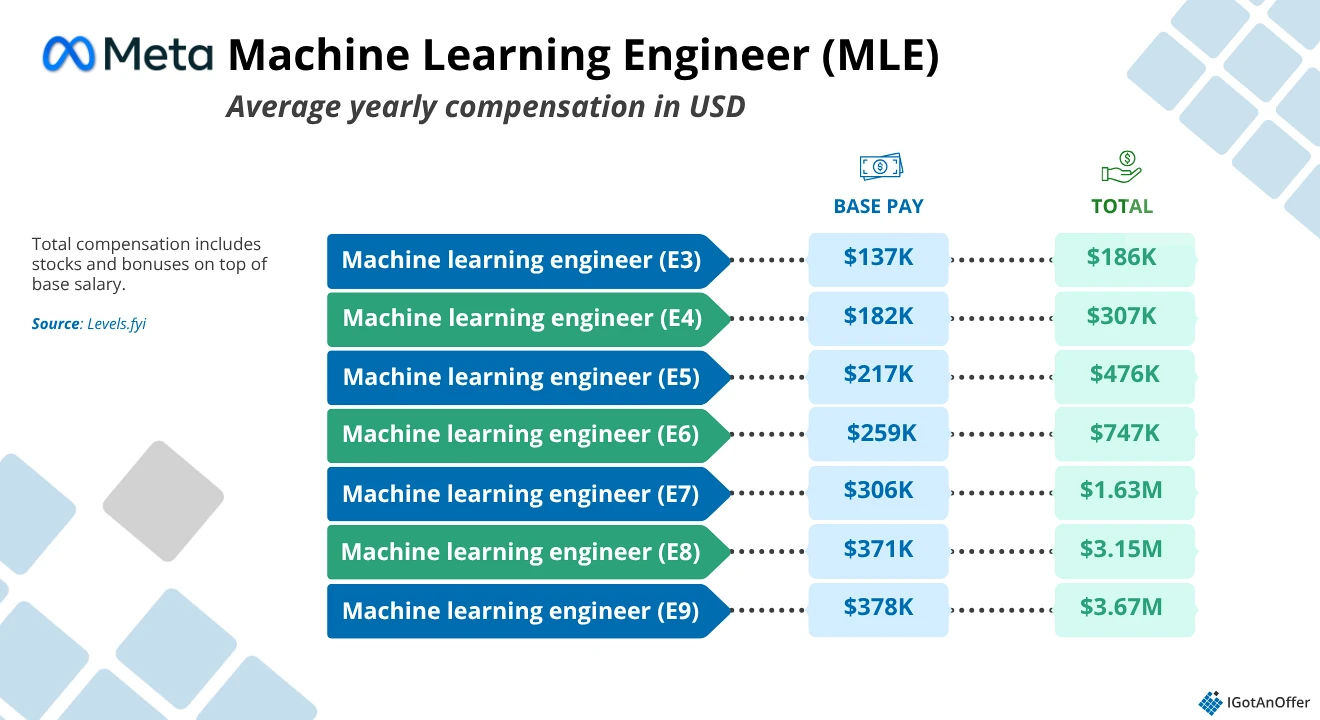
The average salary of Meta ML engineers also varies depending on location. For example, a Meta ML engineer at the E4 level in the U.S. typically earns significantly more than an E4 ML engineer based in India.
While we presume that you already know which specific level you are applying for, it’s still good to double-check this with your recruiter. They should be able to advise you on which level you’re being evaluated.
Ultimately, how you do in your interviews will help determine what you’ll be offered. That’s why hiring one of our ex-Meta interview coaches can provide such a significant return on investment.
And remember, compensation packages are always negotiable, even at Meta. So, if you do get an offer, don’t be afraid to ask for more. If you need help negotiating, use this salary negotiation guide and consider booking one of our salary negotiation coaches to get expert advice.
2. Meta machine learning engineer interview process and timeline↑
Please note that the process outlined below is for E3 and E4 level candidates. If you're interviewing for a more senior individual contributor role, it might change slightly. Check out our guides to Meta E5 and Meta E6 interviews for more details.
2.1 What interviews to expect
What's the Meta interview process and timeline for a machine learning engineer role? It normally follows the steps below:
- Resume screen
- Recruiter screen
- Initial tech screen
- Full interview loop (up to 6)
Next, we'll dig into each of these steps in more detail. If you're interviewing for a machine learning engineering post with multiple companies, take a look at our guides to the Google ML engineer interview and the Amazon ML engineer interview.
2.1.1 Resume screen
First, recruiters will look at your resume and assess if your experience matches the open position. This is the most competitive step in the process, as millions of candidates do not make it past this stage.
So take extra care to tailor your resume to the specific position you're applying for, with tips from our machine learning resume guide. Check out real Meta resume examples to see what kinds of resumes stand out.
If you’re looking for expert feedback, get input from our team of ex-FAANG/MAANG recruiters, who will cover what achievements to focus on (or ignore), how to fine-tune your bullet points, and more.
2.1.2 Recruiter screen
In most cases, you'll start your interview process with Meta by talking to an HR recruiter. They are looking to confirm that you've got a chance of getting the job at all, so be prepared to explain your background and why you’re a good fit at Meta.
You should expect typical behavioral and resume questions like "Tell me about yourself", "Why Meta?", or "Tell me about your current project."
If you get past this first HR screen, the recruiter will then help schedule your next interview (a tech screen).
One great thing about Meta is that they are very transparent about their recruiting process. As a result, your HR contact will probably walk you through the remaining steps in the hiring process at this time.
2.1.3 Initial tech screen
The initial tech screen is a 45-minute interview with a Meta engineer. It’s designed to assess your technical skills.
Once you’re scheduled for this tech screen, be sure to let your recruiter know which coding language you’ll be using.
The session is divided into 3 parts:
-
Introduction, during which you’ll be asked about yourself and your background. Prepare a succinct description of yourself, your professional experience, expertise, and interests. Keep it under 5 minutes.
-
Coding, which is the bulk of the interview, at 35 minutes. Expect to answer 2 coding problems focused on CS fundamentals like algorithms, data structures, recursions, and binary trees. If your tech screen is in person, prepare to whiteboard. If it’s through video or phone, prepare to code on an editor like Coderpad.io. Make sure to clarify this with your recruiter when you get scheduled for a tech screen.
-
Questions, during which the interviewer will give you 5 minutes to ask some questions about the job.
When prepping for this part of the application process, set a timer to solve medium and hard questions in 15 minutes or less (as you’ll be solving 2 questions in 35 minutes), and practice talking your way through your process.
Click here to download the official prep guide for Meta’s initial ML tech screen.
2.1.4 Full interview loop
Once you pass the initial tech screen, your recruiter will schedule you for the full interview loop. This is the real test. You'll typically do up to six different interviews on a set of topics, and you should plan to spend the full day interviewing.
Each interview will last about 45 minutes and will focus on one of the following topics:
- Coding interview, where you'll solve algorithm and data structure questions similar to those you'd encounter in a software engineer interview.
- Machine learning system design, where you’ll be asked to design ML systems to benefit a particular feature/solve a problem
- Behavioral interview, where you can expect questions about your background, accomplishments, and your motivation for applying to Meta
During the full interview loop, you'll typically get two coding interviews, one or two ML system design interviews, and one behavioral interview. Just keep in mind that the exact breakdown might vary depending on the role, team, and level you're applying for.
Click here to download the official prep guide for Meta’s full ML interview loop.
It's worth briefly mentioning that some candidates have reported a different interview process, where they move from coding interviews straight to team matching interviews (which are similar to behavioral interviews).
However, we would only expect that process for specialized roles or unique circumstances. So, you should prepare for the interview process outlined above, unless you have been informed otherwise by Meta.
2.2 What happens behind the scenes
Throughout the interview process at Meta, the recruiter usually plays the role of "facilitator" and moves the process from one stage to the next. Here's an overview of what typically happens behind the scenes:
- After the initial tech screen, the interviewer you've talked to will have 24 hours to submit their ratings and notes to the internal system. Your recruiter then reviews the feedback and decides to move you to the full interview loop or not, depending on how well you've done.
- After the interview loop, your interviewers will make a recommendation on hiring you or not, and the recruiter compiles your "packet" (interview feedback, resume, referrals, etc.). If they think you can get the job, they will present your case at the next candidate review meeting.
- Candidate review meetings are used to assess all candidates who have recently finished their interview loops and are close to getting an offer. Your packet will be analyzed, and possible concerns will be discussed. Your interviewers are invited to join your candidate review meeting, but will usually only attend if there's a strong disagreement in the grades you received (e.g., 2 no-hires, 2 hires). If, after discussion, the team still can't agree whether you should get an offer or not, you might be asked to do a follow-up interview to settle the debate. At the end of the candidate review meeting, a hire / no-hire recommendation is made for consideration by the hiring committee.
- The hiring committee includes senior leaders from across Meta. This step is usually a formality, and the committee follows the recommendation of the candidate review meeting. The main focus is on fine-tuning the exact level and, therefore, the compensation you will be offered.
It's also important to note that hiring managers and people who refer you have little influence on the overall process. They can help you get an interview at the beginning, but that's about it.
3. Meta machine learning engineer example questions↑
Okay, now that we've covered the interview process, let's dig into the three types of interviews that you'll encounter:
Below, we've put together a summarized list of example questions for each of these interview types. We've also provided a few notes about them, which should help you get a better idea of what to expect. Let's jump in!
3.1 Coding interview
Both before and during the full interview loop, you'll have coding interviews at Meta. For this part of the interview loop, expect to answer 2 coding questions per 45-minute interview session.
Meta's engineers (across disciplines) use code to solve some of the most difficult problems the company faces. As a result, it's essential for all of the company's new engineers to have strong foundational coding skills.
Since you're applying for a machine learning position, you're probably wondering what kind of machine learning problems you'll be asked. We'll get into that more in the section below. But for coding interviews, you can expect data structure and algorithm questions that are very similar to the questions a normal Meta software engineer candidate would be asked.
So, to help you structure your preparation, we've pulled in the below summary of Meta's most common coding question categories. This information is based on our analysis of Glassdoor data for Meta software engineer interviews.
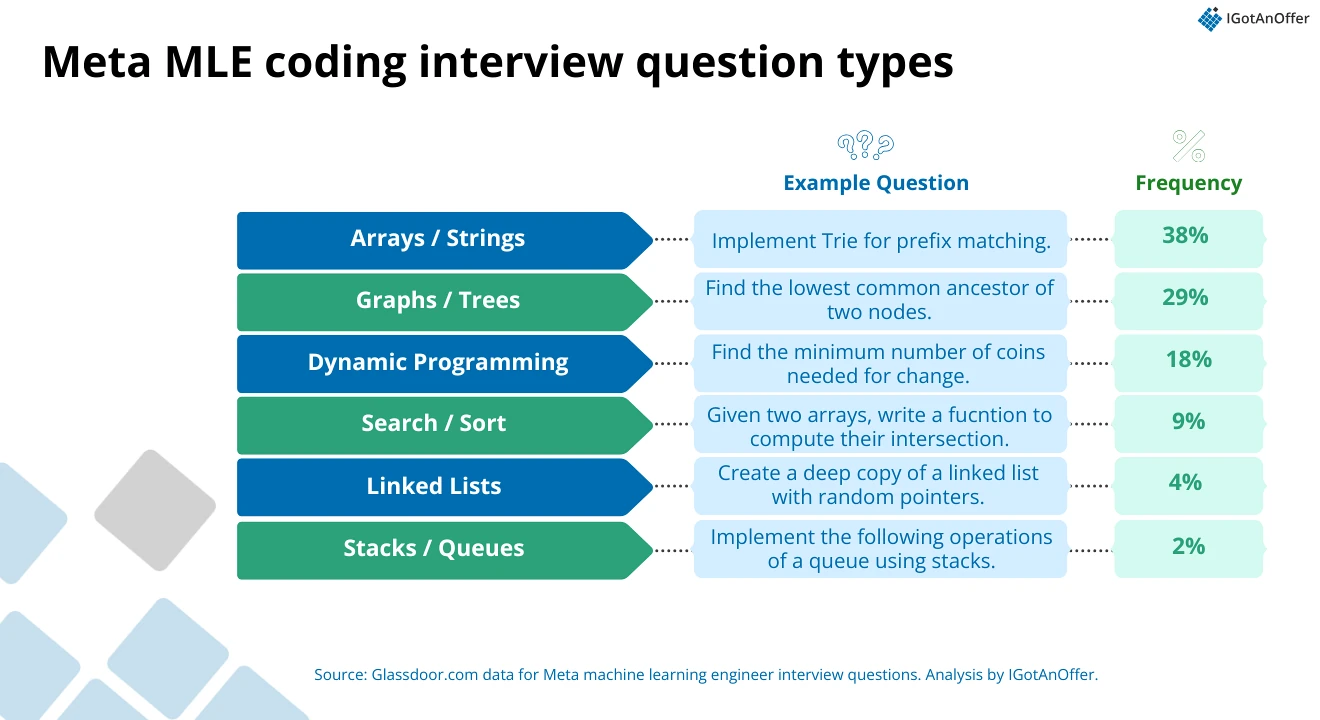
Example coding questions asked in Meta MLE interviews
1. Arrays / Strings (38% of questions, most frequent)
- Given an array
numsof n integers where n > 1, return an arrayoutputsuch thatoutput[i]is equal to the product of all the elements ofnumsexceptnums[i]. (Solution) - Given a non-empty string
s, you may delete at most one character. Judge whether you can make it a palindrome. (Solution) - Implement
next permutation, which rearranges numbers into the lexicographically next greater permutation of numbers. (Solution) - Given a string S and a string T, find the minimum window in S which will contain all the characters in T in complexity O(n). (Solution)
- Given an array of strings strs, group the anagrams together. (Solution)
- Given a string s containing just the characters '(', ')', '{', '}', '[' and ']', determine if the input string is valid. (Solution)
- Given an array
numsof n integers, are there elements a, b, c innumssuch that a + b + c = 0? Find all unique triplets in the array which gives the sum of zero. (Solution) - Compare two texts and return the top k common characters. (Solution)
- Find the maximum in an array. If multiple elements share the same maximum value, return one of them uniformly at random. (Solution)
- Return the output as a concatenation of words from the dictionary separated by a single space. (Solution)
Example: string = "catsanddogs", wordDict = ["cat", "sand", "cats", "dog", "and"].
Possible outputs: "cat sand dogs" or "cats and dogs". - Return the top k integers with the highest frequencies in an array. (Solution)
- Find the length of the longest subarray whose sum equals a given target. (Solution)
Check out our list of array interview questions and string interview questions for more samples with solutions.
2. Graphs / Trees (29%)
- Given the
rootnode of a binary search tree, return the sum of values of all nodes with value betweenLandR(inclusive). (Solution) - Given a Binary Tree, convert it to a Circular Doubly Linked List (In-Place). (Solution)
- Implement an iterator over a binary search tree (BST). Your iterator will be initialized with the root node of a BST. (Solution)
- Given a binary tree, you need to compute the length of the diameter of the tree. (Solution)
- Serialize and deserialize a binary tree. (Solution)
- Given a binary tree, find the maximum path sum. (Solution)
- Given a sorted dictionary (array of words) of an alien language, find order of characters in the language. (Solution)
-
Check whether a given graph is Bipartite or not. (Solution)
- Convert a binary tree into a doubly linked list using pre-order traversal. (Solution)
- Find the maximum subtree sum. Consider every node in the tree as a potential root, calculate the sum of its subtree, and return the maximum. (Solution)
- Compute the height of a tree where each node can have an odd number of children only. (Solution)
Check out our list of graph interview questions and tree interview questions for more samples with solutions.
3. Dynamic Programming (18%)
- Given a list of non-negative numbers and a target integer k, write a function to check if the array has a continuous subarray of size at least 2 that sums up to the multiple of k, that is, sums up to n*k where n is also an integer. (Solution)
- Say you have an array for which the ith element is the price of a given stock on day i. If you were only permitted to complete at most one transaction (i.e., buy one and sell one share of the stock), design an algorithm to find the maximum profit. (Solution)
- Given an input string (
s) and a pattern (p), implement regular expression matching with support for'.'and'*'. (Solution) - You are given a list of non-negative integers, a1, a2, ..., an, and a target, S. Now you have 2 symbols
+and-. For each integer, you should choose one from+and-as its new symbol. Find out how many ways to assign symbols to make sum of integers equal to target S. (Solution)
Check out our list of dynamic programming interview questions for more samples with solutions.
4. Search / Sort (9%)
- We have a list of
pointson the plane. Find theKclosest points to the origin(0, 0). (Solution) - Given two arrays, write a function to compute their intersection. (Solution)
- Given an array of meeting time intervals consisting of start and end times [[s1,e1],[s2,e2],...] find the minimum number of conference rooms required. (Solution)
Check out our search interview questions and sort interview questions for more samples with solutions.
5. Linked lists (4%)
- A linked list is given such that each node contains an additional random pointer which could point to any node in the list or null. Return a deep copy of the list. (Solution)
Check out our list of linked list interview questions for more samples with solutions.
6. Stacks / Queues (2%)
- Implement the following operations of a queue using stacks. (Solution)
Check out our list of stack interview questions and queue interview questions for more samples with solutions.
Finally, we recommend reading our guide on Meta coding interviews, how to answer coding interview questions, and practicing with this list of coding interview examples in addition to those listed above.
3.2 Machine learning system design interview
Meta’s machine learning system design interviews are designed to assess whether you can successfully design and build large-scale ML systems to solve some of Meta’s problems. It’s a 45-minute stand-alone session, and you can expect to undergo one or two.
During this part of the interview loop, you’ll be assessed on your skills in problem navigation, training data, feature engineering, modeling, and evaluation & deployment.
Meta ML system design interview questions are somewhat similar to system design questions, in that you'll need to outline a high-level approach for a system or problem. The primary difference is that you'll be expected to specifically develop a machine learning solution. So be sure to brush up on basic ML theory and algorithm details.
The examples below are the three provided by Meta in their ML engineer full interview loop prep guide. Many recent candidates on Glassdoor report getting these exact questions for the ML system design interview.
Machine learning system design questions asked at Meta MLE interviews
- Design a personalized news ranking system.
- Design a product recommendation system.
- Design an evaluation framework for ads ranking.
- Design the “next post” logic for Facebook’s news feed with given constraints and optimization goals.
- Design a recommendation system for Facebook Ads, explaining your process and justifying your choices step by step.
- Design a model for language translation.
- Design a Story feature for Instagram and describe the ML components involved.
- Design a machine learning app that recommends places for users to visit along their trip.
- Design an end-to-end classification pipeline for Facebook Marketplace.
Check out our machine learning system design interview guide for a sample answer outline and more practice questions.
3.3 Behavioral interview
For the behavioral interview, and sometimes at the beginning of your other interviews, you'll be asked behavioral or "resume" questions. These questions focus on your past work experience, your qualifications, and your motivation for applying to Meta. In other words, it's a way for your interviewer to get to know you better.
Behavioral questions are a great opportunity to tell your story, highlight your top qualifications, and demonstrate your alignment with Meta's values and culture.
You should also be ready to drill down into the technical details of the projects on your resume and discuss the types of projects you'd like to work on in the future. Having clarity in these areas will help you make a strong impression in behavioral interviews.
Pranav, ex-Meta engineering manager, told us that Meta looks for the following key behavioral traits in engineers:
- How good are you at resolving conflict with your peers, managers, or external teams?
- Do you have a growth mindset? Do you accept feedback openly and work to resolve it?
- How well do you deal with ambiguity? How do you bring structure in place when there is none?
- How do you sustain progress despite multiple hurdles?
- How well are you at communicating with peers, cross-functional partners, and the team?
Another thing that makes Meta unique is its bottom-up culture, says Tom, ex-data engineering manager at Meta. For every Meta candidate, especially those in the engineering roles, "There is an expectation that you will have a strong level of autonomy, ownership, and dealing with ambiguity." Come prepared with stories of how you worked through ambiguity and how you demonstrated ownership in your previous roles.
Below, we've listed several example behavioral questions that were asked in either Meta machine learning engineer or Meta software engineer interviews, according to data from Glassdoor.
This should give you a good list of practice questions to start preparing with. Note that we've edited the language in some places to improve the clarity or grammar of the questions.
Behavioral interview questions asked at Meta MLE interviews
- Tell me about yourself.
- Why Meta?
- Give me an example of a project where you used data and machine learning.
- Tell me about a time you faced an obstacle and how did you resolve it?
- Tell me about a recent / favorite project and some of the difficulties you had.
- Tell me about the greatest accomplishment of your career.
- Tell me about a time you struggled to work with one of your colleagues.
- Tell me about a time you had to resolve a conflict in a team.
- Tell me about a time you were given feedback that was constructive.
- Tell me about a time you had to step up and take responsibility for others.
- Tell me about your worst boss and why they were bad.
- Tell me about a time you maintained an end-to-end ML pipeline in production? Describe your role and what you learned from it.
- What is your proudest project, and why?
To practice with more general behavioral questions, check out our Meta behavioral interview guide.
4. Meta machine learning engineer interviewing tips ↑
You might be a fantastic ML engineer, but unfortunately, that won’t necessarily be enough to ace your interviews at Meta. Interviewing is a skill in itself, that you need to learn.
Let’s look at some key tips to make sure you approach your interviews in the right way.
4.1 Ask clarifying questions
Often, the questions you’ll be asked will be quite ambiguous, so make sure you ask questions that can help you clarify and understand the problem. Most of the questions will focus on testing your technical proficiency.
4.2 Communicate efficiently
During your technical interviews, you’ll also be assessed on your communication skills and how you talk through your problem-solving process. Use this as your opportunity to show how well you communicate and collaborate with colleagues by treating your technical interviews like a conversation.
For example, in coding interviews, Meta recommends that you talk as you code so the interviewer can follow your reasoning.
In system design interviews, start by stating your assumptions to make sure you’re aligned with your interviewer.
And in behavioral interviews, set up your situation quickly before diving into your actions and results.
A great way to improve this skill is to familiarize yourself with answer frameworks, such as IGotAnOffer’s SPSIL framework (Situation, Problem, Solution, Impact, Learning) for behavioral interviews, or the 4-step system design framework we recommend to candidates for tackling ML system design questions.
4.3 Scope the problem and state your assumptions clearly
During your machine learning system design interview, you will likely be asked to design large-scale systems like Spotify or YouTube. Since this can be impossible in around 45 minutes, it’s important to scope out the problem first.
Start by clarifying the requirements with your interviewer. Then, clearly state your assumptions and check with your interviewer to see if those assumptions are reasonable.
For example, during a system design interview, Oussama, ex-Amazon ML Solutions Architect, says to “ask your interviewers which part of your architecture they want you to detail or which assumptions you would like to make.”
Oussama says that doing so will help reduce the scope and clarify the context of the problem. “Feel free to make assumptions as long as you communicate them clearly. Share your thought process, including both the choices you make and the ones you discard.”
4.4 Present multiple possible solutions
When you code, present multiple possible solutions if you can. Meta wants to know your reasoning for choosing a certain solution.
4.5 Center on Meta’s values
Make sure to review Meta’s core values and align your behavioral responses with them. Prepare anecdotes/concrete examples from your professional experience corresponding to each Meta core value. To be more efficient, adapt your stories so they can respond to different values.
4.6 Brute force, then iterate
When coding or designing a system, don’t necessarily go for the perfect solution straight away. Meta recommends that you first try and find a solution that works, then iterate to refine your answer. Keep your code simple–if you can’t explain it in 5 minutes, it might be too complex.
4.7 Keep your code organized
Make sure to keep your code organized so your interviewer won’t have a hard time understanding what you’ve written. Meta wants to see that your code has captured the right logical structure.
4.8 Get comfortable with coding on various mediums
Meta typically asks interviewees to code in CoderPad.io if the interview is done online. But if the interview is in person, you might be asked to code on paper or a whiteboard. You can check with your recruiter which one it will be if you’re not sure which medium to use.
5. Preparation plan ↑
Now that you know what questions to expect, let's focus on how to prepare. It's no secret that the performance bar at Meta is quite high. To help you maximize your chances of landing an offer, we've listed the four steps we recommend taking to prepare below.
5.1 Learn about Meta's culture
Most candidates fail to do this. But before investing a ton of time preparing for an interview at Meta, you should make sure it's actually the right company for you.
Meta is prestigious, and so it's tempting to assume that you should apply without considering things more carefully. But it's important to remember that the prestige of a job (by itself) won't make you happy in your day-to-day work. It's the type of work and the people you work with that will.
If you know any engineers, data scientists, or other professionals who work at Meta (or used to), it's a good idea to talk to them to understand what the culture is like.
In addition, we would recommend checking out these resources:
- Meta's 6 core values
- Facebook’s hacker culture (by Mark Zuckerberg, via Wired)
- Meta annual reports and strategy presentations (by Meta)
- Meta's approach to tech trends (by CB Insights)
- Meta org culture analysis (by Panmore Institute)
- ML Applications Archive (by Meta)
- ML Research (by Meta)
5.2 Practice by yourself
As mentioned above, you'll have three main types of interviews for the ML engineering position at Meta: coding, machine learning system design, and behavioral.
Coding
For coding interviews, we recommend reading this article written by an ex-Meta interviewer to understand more about the step-by-step approach you should use to solve coding questions in an interview.
If you're looking for the best resource for prepping for coding interviews, we recommend using our comprehensive coding interview prep guide as your prep launchpad. There you'll find interviewing and preparation tips and links to deep-dive resources on answer methods, data structures, algorithms, and example questions.
Then, refer to our Meta coding interview guide for company-specific insights and more sample questions with solutions.
When practicing coding, set a timer for 15 minutes or less per problem. Get used to writing code without executing it–without the help of a compiler and debugger–to simulate the coding interview process.
Practice solving fewer example problems of as many problem types as you can, so you’ll be better prepared, instead of deep diving into one type of problem. This will help you cover all the bases and feel more confident tackling any question that comes up during the interview.
Machine learning system design
For machine learning system design interviews, we recommend that you study Meta's machine learning field guide to make sure you understand the end-to-end process for implementing machine learning solutions.
Then, you can get some practice using the example questions we've provided in Section 3.2 above. You can also use our machine learning system design interview guide, which covers a step-by-step method for answering ML system design questions.
Meta recommends practicing for the ML system design interview by taking any well-known app and picking a system that could benefit from a machine learning solution.
Behavioral
For behavioral interviews, we recommend learning our step-by-step method for answering behavioral questions. Then, you can practice answering the questions listed in Section 3.3 above. If you have more time to prepare, then you can prepare even more "stories" summarizing your top qualifications or important lessons that you've learned.
Meta has great prep guides for the initial tech screen and full interview loop. Download and review them as closely as possible and use their coding exercises when practicing.
We also have an article on what a real Meta interview experience is like, with success stories from people we've worked with. Check that out to get some prep best practices from successful candidates.
Finally, a great way to practice all of these interviews is to interview yourself out loud. This may sound strange, but it will significantly improve the way you communicate your answers during an interview.
Play the role of both the candidate and the interviewer, asking questions and answering them, just like two people would in an interview. Trust us, it really helps!
Applying for a specific ML or AI-focused tech company? You might want to check out these company-specific interview guides as well:
Once you’re in command of the relevant subject matters, you’ll want to practice answering questions. But by yourself, you can’t simulate thinking on your feet or the pressure of performing in front of a stranger. Plus, there are no unexpected follow-up questions and no feedback.
That’s why many candidates try to practice with friends or peers.
5.3 Practice with peers
If you have friends or peers who can do mock interviews with you, that's an option worth trying. It’s free, but be warned, you may come up against the following problems:
- It’s hard to know if the feedback you get is accurate
- They’re unlikely to have insider knowledge of interviews at your target company
- On peer platforms, people often waste your time by not showing up
For those reasons, many candidates skip peer mock interviews and go straight to mock interviews with an expert.
5.4 Practice with experienced Meta interviewers
In our experience, practicing real interviews with experts who can give you company-specific feedback makes a huge difference.
Find a Meta machine learning interview coach so you can:
- Test yourself under real interview conditions
- Get accurate feedback from a real expert
- Build your confidence
- Get company-specific insights
- Learn how to tell the right stories better
- Save time by focusing your preparation
Landing a job at a big tech company often results in a $50,000 per year or more increase in total compensation. In our experience, three or four coaching sessions worth ~$500 make a significant difference in your ability to land the job. That’s an ROI of 100x!








